HIF-2 alpha/EPAS1 Antibody - BSA Free Best Seller
Novus Biologicals, part of Bio-Techne | Catalog # NB100-122

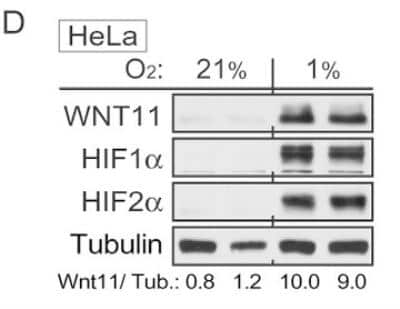
Conjugate
Catalog #
Key Product Details
Validated by
Knockout/Knockdown, Orthogonal Validation, Biological Validation
Species Reactivity
Validated:
Human, Mouse, Rat, Fish, Hamster, Primate, Rabbit, Reptile, Sheep
Cited:
Human, Mouse, Rat, Fish - Danio rerio (Zebrafish), Hamster, Ovine, Rabbit, Reptile
Applications
Validated:
Chromatin Immunoprecipitation (ChIP), Dual RNAscope ISH-IHC, ELISA, Flow Cytometry, Gel Super Shift Assays, Immunoblotting, Immunocytochemistry/ Immunofluorescence, Immunohistochemistry, Immunohistochemistry-Frozen, Immunohistochemistry-Paraffin, Immunoprecipitation, In vitro assay, Knockdown Validated, Knockout Validated, SDS-Page, Simple Western, Western Blot
Cited:
Block/Neutralize, Chemotaxis, Chip Cytometry, Chromatin Immunoprecipitation (ChIP), CoIP, ELISA, Flow Cytometry, Functional Assay, Gel Supershift Assay, IF/IHC, Immunoblotting, Immunocytochemistry, Immunocytochemistry/ Immunofluorescence, Immunohistochemistry, Immunohistochemistry-Frozen, Immunohistochemistry-Paraffin, Immunoprecipitation, In vivo assay, Knockdown Validated, Knockout Validated, Western Blot
Label
Unconjugated
Antibody Source
Polyclonal Rabbit IgG
Format
BSA Free
Concentration
1.0 mg/ml
Product Specifications
Immunogen
This HIF-2 alpha/EPAS1 Antibody was developed against a peptide derived from the C-terminus of mouse/human HIF-2 alpha protein.
Reactivity Notes
Use in Mouse reported in scientific literature (PMID:33758176).
Specificity
This HIF-2 alpha/EPAS1 Antibody is specific for HIF-2 alpha/EPAS, and does not cross-react with HIF-1 alpha.
Clonality
Polyclonal
Host
Rabbit
Isotype
IgG
Theoretical MW
96.5 kDa.
Disclaimer note: The observed molecular weight of the protein may vary from the listed predicted molecular weight due to post translational modifications, post translation cleavages, relative charges, and other experimental factors.
Disclaimer note: The observed molecular weight of the protein may vary from the listed predicted molecular weight due to post translational modifications, post translation cleavages, relative charges, and other experimental factors.
Scientific Data Images for HIF-2 alpha/EPAS1 Antibody - BSA Free
Dual RNAscope ISH-IHC Analysis of HIF-2 alpha/EPAS1 in Human Placenta
Formalin-fixed paraffin-embedded tissue sections of human placenta were probed for HIF-2 alpha/EPAS1 mRNA (ACD RNAScope Probe, catalog #410598; Fast Red chromogen, ACD catalog # 322750). Adjacent tissue section was processed for immunohistochemistry using Rabbit Polyclonal (Novus Biologicals catalog # NB100-122) at 1:100 dilution with one-hour incubation at room temperature followed by incubation with anti-rabbit IgG VisUCyte HRP Polymer Antibody (Catalog # VC003) and DAB chromogen (yellow-brown). Tissue was counterstained with hematoxylin (blue). Specific staining was localized to trophoblastic cells.Applications for HIF-2 alpha/EPAS1 Antibody - BSA Free
Application
Recommended Usage
Chromatin Immunoprecipitation (ChIP)
1:10-1:500
ELISA
1:100 - 1:2000
Gel Super Shift Assays
reported in scientific literature (PMID 15184875)
Immunoblotting
reported in scientific literature (PMID 28115701)
Immunocytochemistry/ Immunofluorescence
1:100
Immunohistochemistry
1:100
Immunohistochemistry-Paraffin
1:100
Immunoprecipitation
5 ug / 1 mg lysate
In vitro assay
reported in scientific literature (PMID 24998849)
Knockdown Validated
reported in scientific literature (PMID 31061092)
Knockout Validated
reported in scientific literature (PMID 26861754)
Simple Western
1:50
Western Blot
1 - 2 ug/mL
Application Notes
In WB, this antibody recognizes a band at 118 kDa representing HIF-2 alpha.
See Simple Western Antibody Database for Simple Western validation: tested in hypoxic HeLa lysate (0.5 mg/ml); separated by Size- Wes/Sally Sue/Peggy Sue; antibody dilution of 1:50; apparent MW in kDa on Simple Western was 110kDa; matrix was 12-230 kDa.
See Simple Western Antibody Database for Simple Western validation: tested in hypoxic HeLa lysate (0.5 mg/ml); separated by Size- Wes/Sally Sue/Peggy Sue; antibody dilution of 1:50; apparent MW in kDa on Simple Western was 110kDa; matrix was 12-230 kDa.
Reviewed Applications
Read 39 reviews rated 4.4 using NB100-122 in the following applications:
Formulation, Preparation, and Storage
Purification
Immunogen affinity purified
Formulation
PBS
Format
BSA Free
Preservative
0.05% Sodium Azide
Concentration
1.0 mg/ml
Shipping
The product is shipped with polar packs. Upon receipt, store it immediately at the temperature recommended below.
Stability & Storage
Store at -20 °C.
Background: HIF-2 alpha/EPAS1
HIF-1 or hypoxia inducible factor 1, is a transcription factor commonly referred to as a "master regulator of the hypoxic response" for its central role in the regulation of cellular adaptations to hypoxia. Similarly, HIF-2 alpha plays a role in cellular responses to hypoxia, but whereas HIF-1 alpha is ubiquitously expressed, HIF-2 alpha is predominantly expressed in the vascular endothelium at embryonic stages and after birth in select cells and tissue types (e.g., fibroblasts, hepatocytes and myocytes at 96kDa) (4). Following a similar mechanism to HIF-1 alpha, HIF-2 alpha is stabilized under hypoxic conditions by the formation of a heterodimer with an ARNT/HIF-1 beta subunit. Stable HIF-2 alpha-ARNT/HIF-1 beta heterodimers engage p300/CBP in the nucleus for binding to hypoxic response elements (HREs), inducing transcription, and thus regulation of genes (e.g., EPO, VEGFA). HIF-1 predominantly transactivates genes involved in glycolytic control and pro- apoptotic genes (e.g., LDHA and BNIP3), and HIF-2 regulates the expression of genes involved in invasion and stemness (e.g., MMP2, and OCT4). Common gene targets for HIF-1 and HIF-2 include VEGFA and GLUT1 (5).
The HIF-2 alpha subunit is rapidly targeted and degraded by the ubiquitin proteasome system under normoxic conditions. This process is mediated by oxygen-sensing enzymes, prolyl hydroxylase domain enzymes (PHDs), which catalyze the hydroxylation of key proline residues (Pro-405 and Pro-531) within the oxygen-dependent degradation domain of HIF-2 alpha (5). Once hydroxylated, HIF-2 alpha binds the von Hippel-Lindau tumor suppressor protein (pVHL) for subsequent ubiquitination and proteasomal degradation (5,6).
References
1. Semenza, G. L., Agani, F., Feldser, D., Iyer, N., Kotch, L., Laughner, E., & Yu, A. (2000). Hypoxia, HIF-1, and the pathophysiology of common human diseases. Advances in Experimental Medicine and Biology.
2.Muz, B., de la Puente, P., Azab, F., & Azab, A. K. (2015). The role of hypoxia in cancer progression, angiogenesis, metastasis, and resistance to therapy. Hypoxia. https://doi.org/10.2147/hp.s93413
3. Huang, Y., Lin, D., & Taniguchi, C. M. (2017). Hypoxia inducible factor (HIF) in the tumor microenvironment: friend or foe? Science China Life Sciences. https://doi.org/10.1007/s11427-017-9178-y
4. Hu, C.-J., Wang, L.-Y., Chodosh, L. A., Keith, B., & Simon, M. C. (2003). Differential Roles of Hypoxia-Inducible Factor 1 (HIF-1) and HIF-2 in Hypoxic Gene Regulation. Molecular and Cellular Biology. https://doi.org/10.1128/mcb.23.24.9361-9374.2003
5. Koh, M. Y., & Powis, G. (2012). Passing the baton: The HIF switch. Trends in Biochemical Sciences. https://doi.org/10.1016/j.tibs.2012.06.004
6. Koyasu, S., Kobayashi, M., Goto, Y., Hiraoka, M., & Harada, H. (2018). Regulatory mechanisms of hypoxia-inducible factor 1 activity: Two decades of knowledge. Cancer Science. https://doi.org/10.1111/cas.13483
Long Name
Hypoxia-inducible Transcription Factor 2 alpha
Alternate Names
EPAS1, HIF 2A, HIF2 alpha, HIF2A, HLF, MOP2, anti hif 2 alpha, anti-HIF-2 alpha
Gene Symbol
EPAS1
Additional HIF-2 alpha/EPAS1 Products
Product Documents for HIF-2 alpha/EPAS1 Antibody - BSA Free
Product Specific Notices for HIF-2 alpha/EPAS1 Antibody - BSA Free
This product is for research use only and is not approved for use in humans or in clinical diagnosis. Primary Antibodies are guaranteed for 1 year from date of receipt.
Loading...
Loading...
Loading...
Loading...
Loading...
Loading...
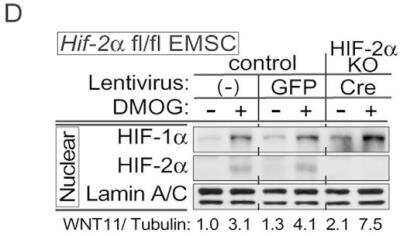
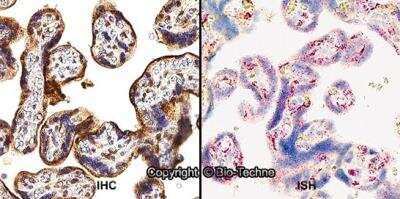
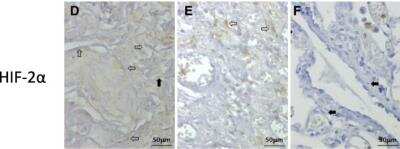

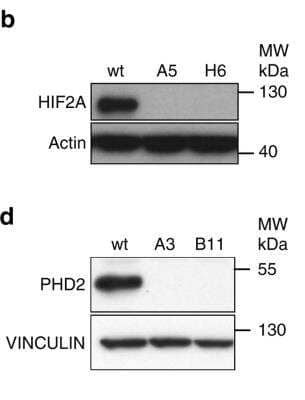
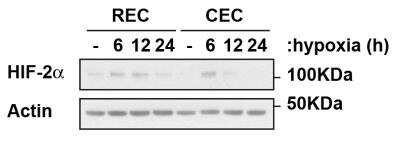
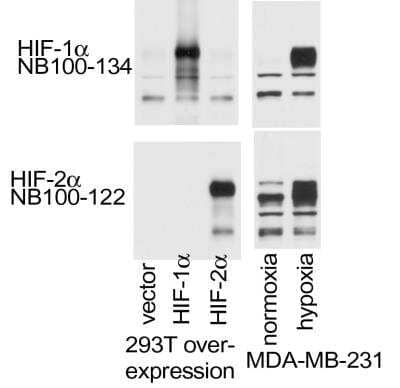
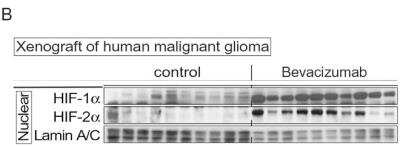
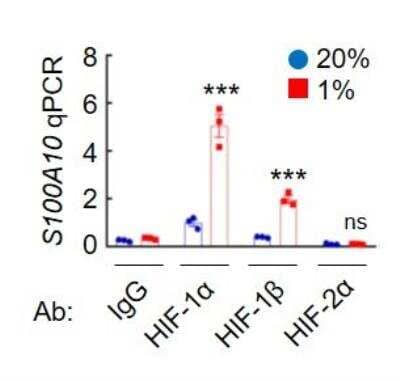
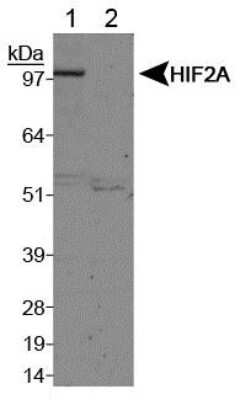
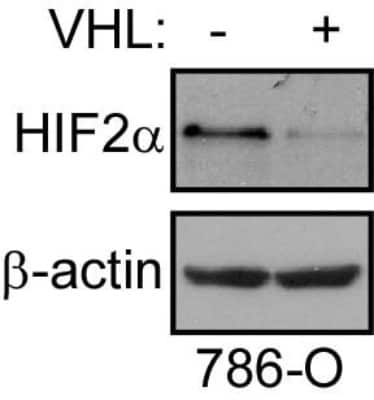
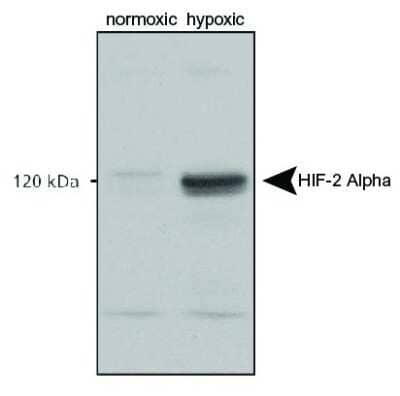
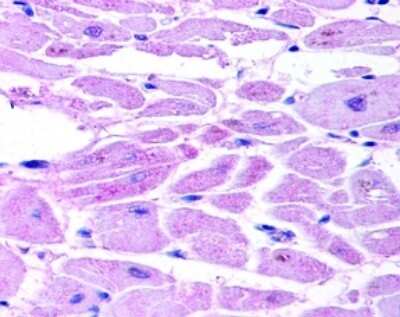
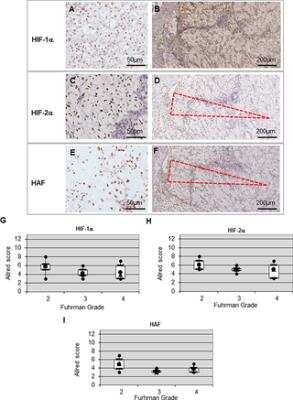
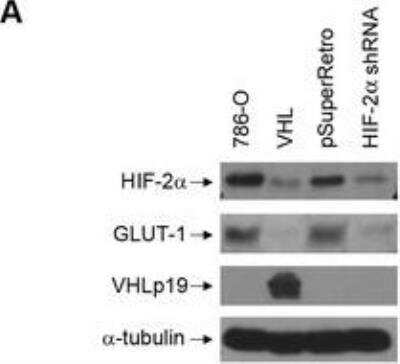
![Knockdown Validated: HIF-2 alpha/EPAS1 Antibody - BSA Free [NB100-122] - HIF-2 alpha/EPAS1 Antibody - BSA Free](https://resources.bio-techne.com/images/products/nb100-122_rabbit-polyclonal-hif-2-alpha-epas1-antibody-271220231261911.jpg)
![Western Blot: Rabbit Polyclonal HIF-2 alpha/EPAS1 Antibody [NB100-122] - HIF-2 alpha/EPAS1 Antibody - BSA Free](https://resources.bio-techne.com/images/products/antibody/nb100-122_rabbit-polyclonal-hif-2-alpha-epas1-antibody-western-blot-222024141448..jpg)
![Immunocytochemistry/ Immunofluorescence: HIF-2 alpha/EPAS1 Antibody - BSA Free [NB100-122] - HIF-2 alpha/EPAS1 Antibody - BSA Free](https://resources.bio-techne.com/images/products/nb100-122_rabbit-polyclonal-hif-2-alpha-epas1-antibody-31020241535648.jpg)
![Immunocytochemistry/ Immunofluorescence: HIF-2 alpha/EPAS1 Antibody - BSA Free [NB100-122] - HIF-2 alpha/EPAS1 Antibody - BSA Free](https://resources.bio-techne.com/images/products/nb100-122_rabbit-polyclonal-hif-2-alpha-epas1-antibody-3102024153569.jpg)
![Immunocytochemistry/ Immunofluorescence: HIF-2 alpha/EPAS1 Antibody - BSA Free [NB100-122] - HIF-2 alpha/EPAS1 Antibody - BSA Free](https://resources.bio-techne.com/images/products/nb100-122_rabbit-polyclonal-hif-2-alpha-epas1-antibody-310202415532070.jpg)
![Gel Super Shift Assays: HIF-2 alpha/EPAS1 Antibody - BSA Free [NB100-122] - HIF-2 alpha/EPAS1 Antibody - BSA Free](https://resources.bio-techne.com/images/products/nb100-122_rabbit-polyclonal-hif-2-alpha-epas1-antibody-310202415532046.jpg)
![Immunocytochemistry/ Immunofluorescence: HIF-2 alpha/EPAS1 Antibody - BSA Free [NB100-122] - HIF-2 alpha/EPAS1 Antibody - BSA Free](https://resources.bio-techne.com/images/products/nb100-122_rabbit-polyclonal-hif-2-alpha-epas1-antibody-31020241612668.jpg)
![Immunocytochemistry/ Immunofluorescence: HIF-2 alpha/EPAS1 Antibody - BSA Free [NB100-122] - HIF-2 alpha/EPAS1 Antibody - BSA Free](https://resources.bio-techne.com/images/products/nb100-122_rabbit-polyclonal-hif-2-alpha-epas1-antibody-310202415532098.jpg)
![Immunocytochemistry/ Immunofluorescence: HIF-2 alpha/EPAS1 Antibody - BSA Free [NB100-122] - HIF-2 alpha/EPAS1 Antibody - BSA Free](https://resources.bio-techne.com/images/products/nb100-122_rabbit-polyclonal-hif-2-alpha-epas1-antibody-310202415541931.jpg)